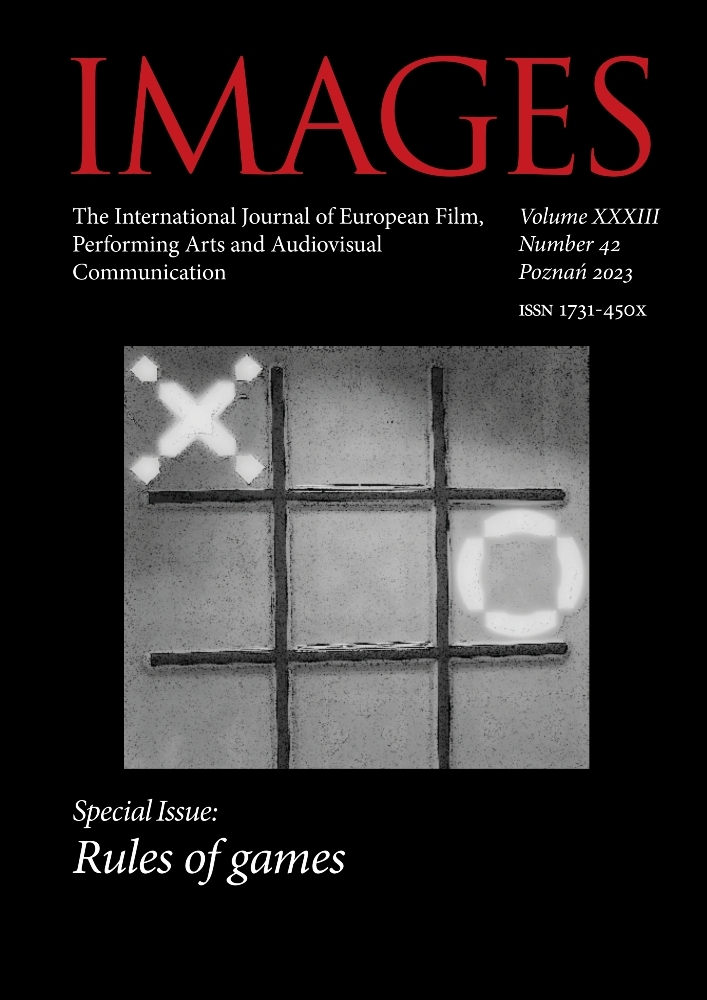Abstrakt
The article Open World and Dispersed Narrative in FromSoftware’s “Elden Ring” tackles a number of design issues associated with open world design in video games. Building upon Tim Ingold’s dis- crepancy of two distinct modes of exploring the reality (wayfaring and trail-following), the author proceeds with analysing how the categories in question might have influenced the design of Elden Ring’s ‘The Lands Between’, which is torn between two different ambitions. One is to create a high fantasy narrative in allotopia, whilst the other is to sustain the principles of procedural rhetoric typical for soulsborne games, well-known for leaning towards a dark fantasy design style both in terms of their aesthetics and narrative content. Consequently, the main goal of this analysis is to propose a potential way of avoiding such inconsequence in open world game design, which is termed here a “ludotopian dissonance”.
Bibliografia
Aarseth E.J., Günzel S., Introduction. Space – The Theoretical Frontier, [w:] Ludotopia: Spaces, Places, and Territories in Computer Games, red. E.J. Aarseth, S. Günzel, Bielefeld 2019, s. 7–10 DOI: https://doi.org/10.14361/9783839447307-001
Bauer R., Suter B., Narrative Mechanics. Strategies and Meanings in Game and Real Life, [w:] Narrative Mechanics, red. B. Suter, R. Bauer, M. Kocher, Bielefeld 2021, s. 19–49 DOI: https://doi.org/10.1515/9783839453452-002
Bicki P., Elden Ring krytykowane przez twórców z Ubisoftu i Guerilla Games, https://www.eurogamer.pl/elden-ring-krytykowane-przez-tworcow-z-ubisoftu-i-guerilla-games (dostęp: 9.11.2022)
Bizzocchi J. et al., The Role of Micronarrative in the Design and Experience of Digital Games, [w:] Proceedings of the 2013 DiGRA International Conference: DeFragging Game Studies, red. C. Pearce, J. Sharp, H.W. Kennedy, Atlanta: DiGRA 2014
Bogost I., Persuasive Games. The Expressive Power of Videogames, Cambridge 2007 Eco U., Po drugiej stronie lustra i inne eseje: znak, reprezentacja, iluzja, obraz, przeł. J. Wajs, Warszawa 2012 DOI: https://doi.org/10.7551/mitpress/5334.001.0001
Elden Ring Wiki, NPCs, https://eldenring.wiki.fextralife.com/NPCs (dostęp: 11.11.2022)
Elden Ring Wiki, Side Quests, https://eldenring.wiki.fextralife.com/Side+Quests (dostęp: 11.11.2022)
Frasca G., Rethinking agency and immersion. Video games as a means of consciousness-raising, „Digital Creativity” 2010, nr 12(3), s. 167–174 DOI: https://doi.org/10.1076/digc.12.3.167.3225
Frontline Gaming Japan, Elden Ring Release Interview with Director Miyazaki (Part 1/2). Discussing Lore and Field Design, https://www.frontlinejp.net/2022/03/05/elden-ring-release-interview-with-director-miyazaki-part-1/ (dostęp: 11.11.2022)
Game Maker’s Toolkit, The World Design of Elden Ring, https://www.youtube.com/watch?v=LvnlvB9n6ic (dostęp: 11.11.2022)
Gregersen A., Grodal T., Embodiment and Interface, [w:] The Video Game Theory Reader 2, red. B. Perron, M.J.P. Wolf, New York – London 2009, s. 65–83
Ingold T., Lines: A Brief History, London 2007 DOI: https://doi.org/10.4324/9780203961155
Jaber M., Cojanu A., The 40 Seconds Rule and Points of Interest in The Witcher 3: Wild Hunt, Uppsala 2021
Kozyra M., Ogrywając porażkę. Konceptualizacja doświadczenia porażki w groznawstwie, „Replay. The Polish Journal of Game Studies” 2019, nr 6(1), s. 37–49. DOI: https://doi.org/10.18778/2391-8551.06.03
Kubiński P., Gry wideo. Zarys poetyki, Kraków 2016
Kunzelman C., How We Deal with Dark Souls. The Aesthetic Category as a Method, [w:] Hybrid Play: Crossing Boundaries in Game Design, Players Identities and Play Spaces, red. A. de Souza e Silva, R. Glover-Rijkse, Abingdon, Oxon – New York, NY 2020, s. 167–81 DOI: https://doi.org/10.4324/9780367855055-14
Maj K.M., Gdzie się kończy otwarty świat? O granicach grywalnej rzeczywistości, „Śląskie Studia Polonistyczne” 2021, t. 18, nr 2, s. 1–15. , „Przestrzenie Teorii” 2021, nr 35, s. 347–364. DOI: https://doi.org/10.31261/SSP.2021.18.04
Maj K.M., On the pseudo-open world and ludotopian dissonance. A curious case of Cyberpunk 2077, „Journal of Gaming & Virtual Worlds” 2022, t. 14, nr 1, s. 51–65. DOI: https://doi.org/10.1386/jgvw_00051_1
Maj K.M., Światotwórstwo w fantastyce. Od przedstawienia do zamieszkiwania, Kraków 2019
Mcintyre B., Hey, Can We Chill With The Souls-Likes?, https://www.thegamer.com/too-many-souls-likes-sekiro-fallen-order/ (dostęp: 11.11.2022)
NoClipe. Video Game Documentaries, Designing The World of The Witcher 3, https://www.youtube.com/watch?v=oSS5T4od-GQ (dostęp: 11.11.2022)
Pigulak J., Narracja linearna w grach wideo w kontekstach immersji, „Replay. The Polish Journal of Game Studies” 2019, nr 6(1), s. 67–79. DOI: https://doi.org/10.18778/2391-8551.06.05
Ryan, M.-L., The Aesthetics of Proliferation, [w:] World-building: Transmedia, Fans, Industries, red. M. Boni, Amsterdam 2017, s. 31–46 DOI: https://doi.org/10.1017/9789048525317.002
Ryan M.-L., Transmedial Storytelling and Transfictionality, „Poetics Today” 2013, nr 34(3), s. 361–388 DOI: https://doi.org/10.1215/03335372-2325250
Stanton R., Elden Ring is Too Big, https://www.pcgamer.com/elden-ring-is-too-big/ (dostęp: 11.11.2022)
Sterczewski P., Retoryka porażki. Semantyczne i perswazyjne funkcje przegranej w serious games, art games i grach głównego nurtu, „Homo Ludens” 2013, nr 1(5), s. 23–36
Toms O., Elden Ring Boss Locations. Where to Find All 238 Elden Ring Bosses, https://www.rockpapershotgun.com/elden-ring-boss-locations (dostęp: 11.11.2022)
Toro J., Elden Ring Is Great. It Would’ve Been Even Better Without the Open World, https://punishedbacklog.com/elden-ring-is-great-it-wouldve-been-even-better-without-the-open-world/ (dostęp: 11.11.2022)
VaatiVidya, Elden Ring’s Lore Explained!, https://www.youtube.com/watch?v=DYDs_Inzkz4 (dostęp: 9.11.2022)
Assassin’s Creed: Odyssey (Ubisoft Québec, 2018)
Assassin’s Creed: Origin (Ubisoft Montreal, 2017)
Assassin’s Creed: Valhalla (Ubisoft Montreal, 2020)
Bloodborn (FromSoftware, 2015)
Cuphead (StudioMDHR, 2017)
Dark Souls (FromSoftware, 2011)
Demon Souls (FromSoftware, 2009)
Detroit: Become Human (Quantic Dream, 2020)
Elden Ring (FromSoftware, 2022)
Red Dead Redemption 2 (Rockstar Games, 2018)
Sekiro: Shadows Die Twice (FromSoftware, 2019)
The Elder Scrolls (Bethesda Softworks, 1994–2011)
The Elder Scrolls V: Skyrim (Bethesda Softworks, 2011)
Wiedźmin 3: Dziki Gon (CD Projekt RED, 2015)
Zelda: Breath of the Wild (Nintendo, 2017)
Licencja
Prawa autorskie (c) 2023 Krzysztof M. Maj

Utwór dostępny jest na licencji Creative Commons Uznanie autorstwa 4.0 Międzynarodowe.

